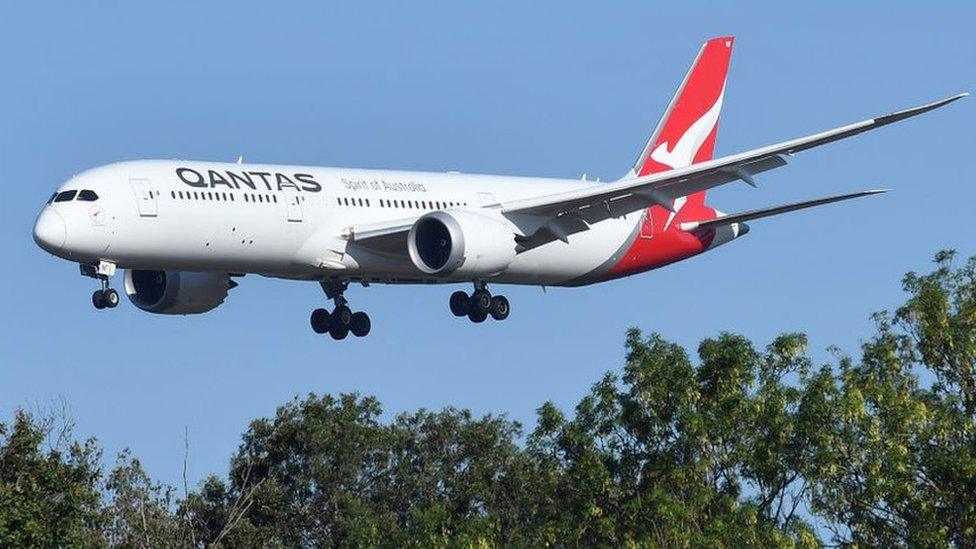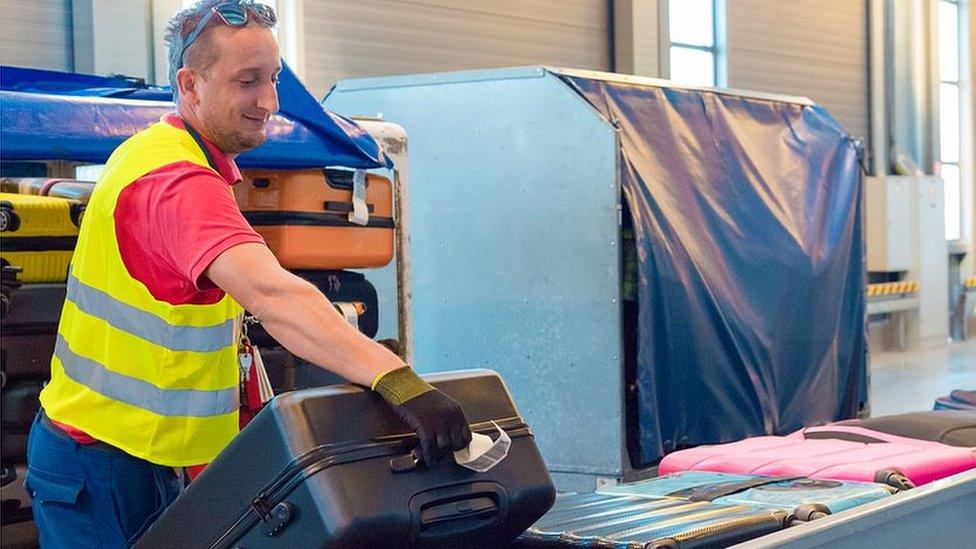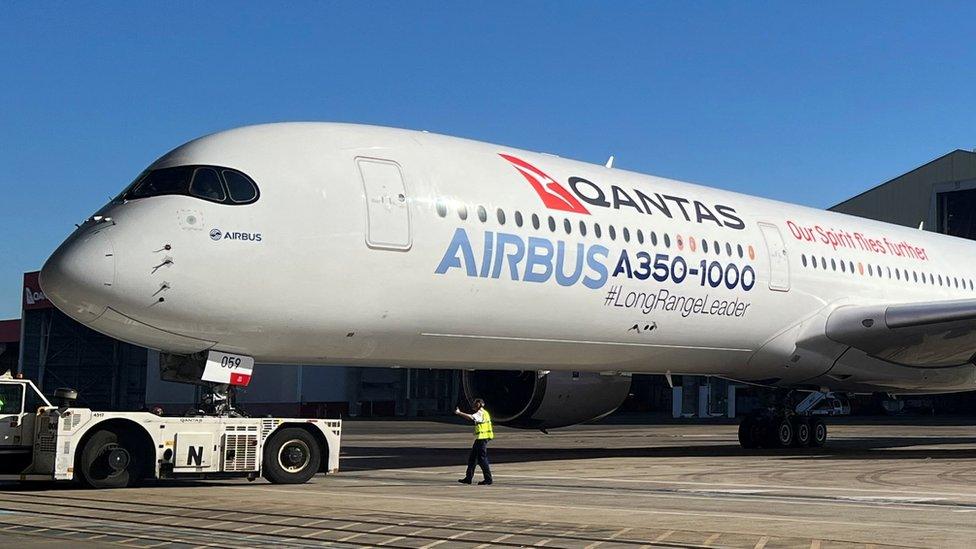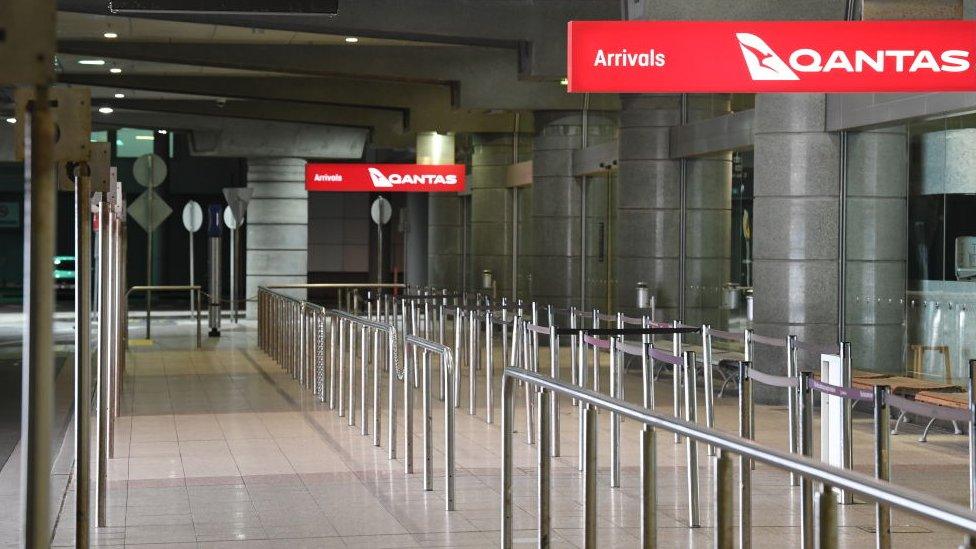Covid: Qantas says pandemic 'existential crisis' is over
- Published

The national carriers of Australia and New Zealand say that the worst of the coronavirus crisis is now behind them, even as they posted annual losses for a third year in a row.
Qantas says it is seeing demand increase "with the existential crisis posed by the pandemic now over".
Air New Zealand says it has also experienced "a very strong recovery in bookings and revenues" since March.
Both countries had imposed some of the world's strictest pandemic travel bans.
Qantas said in a statement on Thursday, external that its underlying loss before tax had widened to A$1.86bn ($1.3bn; £1.1bn) in the year to the end of June, from the previous year.
The company said it had lowered its net debt to a better than expected A$3.94bn.
Qantas chief executive Alan Joyce said "the speed and scale of that recovery has been exceptional".
"Our teams have done an amazing job through the restart and our customers have been extremely patient as the whole industry has dealt with sick leave and labour shortages in the past few months," Mr Joyce added.
Australia reopened its borders to international visitors in February. That marked a closure of nearly two years.
Like much of the global airline industry, Qantas has been struggling to resume its services as borders reopened.
It asked senior executives to work as baggage handlers at the Sydney and Melbourne airports to tackle an acute labour shortage.

The headwinds Qantas still faces
Analysis by Simon Atkinson, BBC News, Brisbane
With vast distances and lack of a decent inter-city rail network (even between Sydney and Melbourne, one of the busiest air routes in the world) flying is the only realistic way to get around Australia if you're in a hurry.
But as traveller demand bounces back, it hasn't always been a particularly enjoyable experience.
On a recent Qantas flight out of Sydney, my fellow passengers surged to get on board with a fervour I'd never seen. But it became clear why.
Tales of lost and delayed baggage have been so commonplace that, perhaps understandably, flyers are not risking putting luggage in the hold.
Instead they're scrabbling for overhead locker space. Finding somewhere, even for a laptop bag, was a real test of my Tetris skills.
An hour's delay on the tarmac didn't help anyone's mood, but we were the lucky ones. Departure boards are littered with last-minute cancelations as airlines struggle with crew phoning in sick, as flu and Covid continue to be a strain.
Other airlines have struggled with staffing and baggage issues too. But as the national carrier, Qantas is the most high profile. And having laid off thousands of baggage handlers during the pandemic, it is an easy target.
Earlier this week, under-fire chief executive Alan Joyce was on the front foot - wielding not only apologies, but discount vouchers, lounge passes and status extensions for those frequent flyers which underpin the business.
These latest results suggest its problem is not so much tempting people back in the air. The pick up in bookings shows that people want to travel again.
In time that will help repair its balance sheet. But just as urgently, Qantas knows it needs to fix its reputation.

Also on Thursday, Air New Zealand said that its pre-tax losses had risen to NZ$725m, external ($449.8m; £380.7m) in the year to the end of June.
However, operating revenue jumped by 9% to NZ$2.7bn over the same period.
Air New Zealand chief executive Greg Foran said the firm was in the "revive" phase of its Covid-19 turnaround.
"When travel restrictions began to lift in March the company recorded a very strong recovery in bookings and revenues," Mr Foran said.
"This trend continues, with high booking levels through July and August," he added.
New Zealand fully opened its borders to travellers earlier this month for the first time since March 2020.

You may also be interested in:
Watch emotional scenes as Australia’s border opens
- Published8 August 2022

- Published2 May 2022

- Published21 February 2022

- Published26 August 2021
